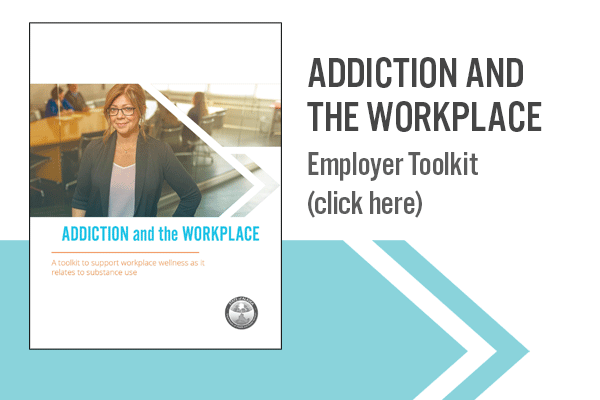Addiction and the Workplace
A toolkit for Alaska workplaces
Employees facing challenges caused by substance use, whether suffering themselves or caring for a loved one, do not do so in a vacuum outside of their workplace. Addiction and the Workplace is a resource designed to help employers consider ways to promote workforce health and protect employee safety.

An update following COVID-19 response:
We recognize this is a challenging time for employers and employees alike. Increases in substance misuse are one anticipated result following the new challenges Alaskans are facing with COVID-19.
If you, an employee or someone you know is showing signs of mental health related distress:
- Call 911 if it is a life-threatening emergency
- Call 211 for information and referral services including a range of nonprofit, government and tribal agencies.
- Call Alaska’s crisis hotline, Careline, at 1-877-266-4357
- Contact the Substance Abuse and Mental Health Service Administration’s Disaster Distress Helpline 1-800-985-5990 or text TalkWithUs to 66746. (TTY 1-800-846-8517)
Reactions to stressful situations vary.
Be vigilant in expressing compassion and showing respect. People will respond to stress differently depending on their background, their risks related to COVID-19 and the risk of people in their household. The Substance Abuse and Mental Health Services Administration published a guidance document about social distancing and isolation, and common stress responses.
Maintain connections to employees.
Social connection helps individuals maintain recovery, and helps to prevent substance misuse. Consider what you are positioned to do as an employer.
- You may decide to provide a moment in meetings or calls with your employee to “check in” and share a personal note (if they wish) about how they’re doing.
- If your team is teleworking, consider a set time for free-flowing conversation and colleague connection through the technology platforms you have in place.
- Provide regular, accurate and unified communication to employees to reduce stress and uncertainty.
- Consider reviewing the toolkit for Alaska employers at the bottom of this page for more ideas about how to build a culture of support.
Help your workforce stay mentally well.
People experiencing economic uncertainty, disruptions in routine and lack of social connection can be especially susceptible to substance misuse. This may include employees who haven’t previously experienced challenges with substance and alcohol.
- If you have an Employee Assistance Program (EAP) to provide a connection to mental health services, now is a good time to remind employees of that service.
- Ensure drug and alcohol policies clearly and compassionately set expectations for employees working from home, as well as procedures for seeking help.
- Recover Alaska has an online screening tool for alcohol and mental health to help people confidentially reflect upon their needs.
- At a time when self-quarantine and social distancing are happening to control the spread of Coronavirus, recovery supports are still available virtually. Learn about virtual resources available during this time on this Substance Abuse and Mental Health Services PDF, this Recover Alaska newsletter and this Addiction Policy Forum page.
- SAMHSA has a helpline to assist with finding behavioral health support or substance use management. Contact 800-662-HELP (4357), TTY: 800-487-4889.
- Additional resources are shared in the employer toolkit at the bottom of this page.
For individuals facing economic uncertainty:
- Call 211 for help navigating available community services to meet needs.
- An FAQ for COVID-19 scenarios and benefits available is available at this Department of Labor page.
- Alaska Job Center Network offers online and telephonic support for placing individuals in employment.
The Centers for Disease Control and Prevention has additional information for businesses to help plan for employee health and safety. The DHSS COVID-19 website provides more Alaska-specific response information.
The value of supporting employees
A clear and compassionate approach to supporting your workforce can have a measurable positive impact not only in their lives, but in the success of a business.
Employees in recovery:
- Have lower healthcare costs, miss less work, and are less likely to leave their employer
- Average 10 percent fewer missed work days than the general workforce and have 8 percent less turnover.3
With an average cost per hire of over $4,000 and a national unemployment rate of less than 4 percent, employers can benefit from making direct efforts to retain employees who are facing substance use challenges.4,5
A newly available resource guide, available here, can help you consider workplace policies and benefits to support a culture of wellness in their workplace.
Public Service Announcements
Provide feedback
Have you consulted the toolkit? We’d like to hear from you.
Click here to complete a brief survey.
About this resource
This work was supported by Cooperative Agreement number 6-NU17CE925015-01, funded by the Centers for Disease Control and Prevention. Its contents are solely the responsibility of the authors and do not necessarily represent the official views of the Centers for Disease Control and Prevention or the Department of Health and Human Services.
This resource was adapted, with permission, from the Kentuckiana Health Collaborative’s resource, “Opioids and the Workplace: An Employer Toolkit for Supporting Prevention, Treatment and Recovery," The resource was supported in part by SAMHSA Grant 1H79TI080264-01, awarded to the Kentucky Cabinet for Health and Family Services. Thank you to the many agencies, organizations and Alaska businesses who collaborated in the adaptation of the Kentuckiana Health Collaborative’s toolkit for Alaska’s needs, and helped to further develop this resource. Thanks, especially, to Recover Alaska for its content contributions.
For additional information, email osmap@alaska.gov.
Sources
-
McDowell Group and the Alaska Mental Health Trust (2019) Summary of the Economic Costs of Sub-stance Use Disorders in Alaska, 2019 Update. Retrieved from https://alaskamentalhealthtrust.org/wp-content/uploads/2020/01/McDowell-Group-Joint-Alcohol-and-Drugs-Summary-1.21.2020.pdf
- B2B International (2017, January) National Employer Survey Prescription Drugs & The US Workforce [Powerpoint Slides]. Retrieved from https://www.nsc.org/Portals/0/Documents/NewsDocuments/2017/ National-Employer-Addiction-Survey-Methodology.pdf?ver=2018-07-05-105114-883
- Ibid.
- Society for Human Resource Management (2017, December) 2017 Talent Acquisition Benchmarking Report. Retrieved from https://www.shrm.org/hr-today/trends-and-forecasting/research-and-surveys/Documents/2017-Talent-Acquisition-Benchmarking.pdf
- Bureau of Labor Statistics (nd.) Civilian Unemployment Rate. Retrieved from https://www.bls.gov/charts/employmentsituation/civilian-unemployment-rate.htm
